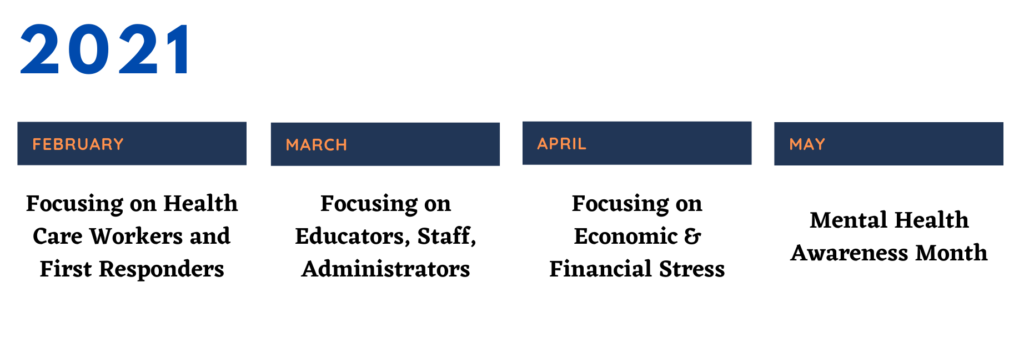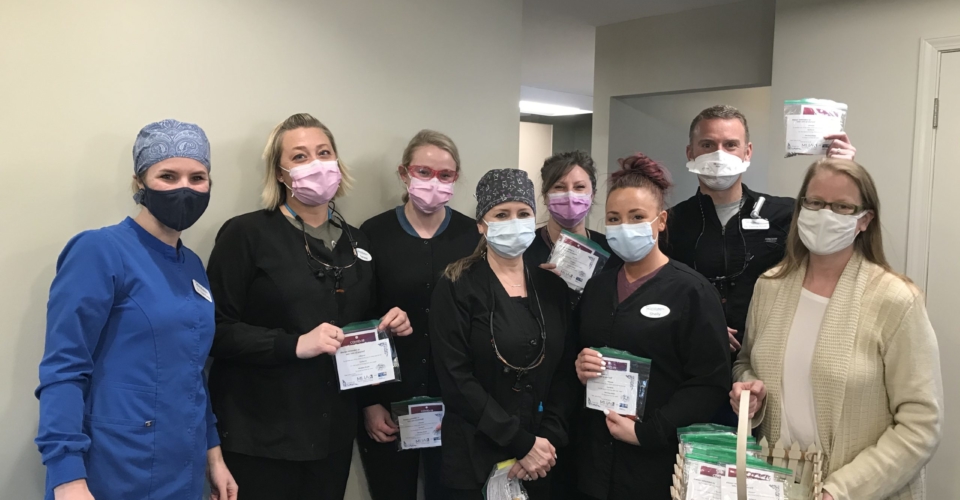From the Pandemic to our Annual Mental Health Awareness Month, MHAoPC focuses on timely subjects:
Starting from February, we will focus on different topics and provide various resources and tools to support the mental and emotional wellness of our community members. On February, we focus on healthcare workers and first responders. On March, we focus on educators, staff and administrators. On April, we focus on the economic and financial stress as the current pandemic-induced financial crisis and stress. It is important to note that financial problems adversely impact our mental health. Lastly, May is Mental Health Awareness Month. Corresponding to the Mental Health Awareness Month, Mental Health America of Putnam County continues to increase the awareness of the importance of mental health and wellness in our community and celebrate recovery from mental illness. Please refer below to see each month’s focus topics:
 Mental Health Resources during the COVID-19 Pandemic – Early 2021
Mental Health Resources during the COVID-19 Pandemic – Early 2021
The mental health effects of COVID-19 are essential to address and in times of high anxiety and stress, it’s more important than ever to safeguard your mental wellness. With generous funding from the United Way of Putnam County, Mental Health America of Putnam County is compiling a range of resources and information to aid our community during this time.
During the COVID-19 pandemic, our health care workers had been fighting at the frontline to protect the health of our community. In order to express the community’s appreciation and are to our health workers, in February, Mental Health American of Putnam County (MHAoPC) delivered over goodie bags of self-care products to local hospitals, nursing homes, and other health care sites. We, as an organization, hope this is a way to recognize the remarkable work of our health care workers and show our care to their health and wellbeing throughout these times.
Just a small token of our immense appreciation to all the health care workers in our county, we’re delivering Goodie Bags. So far, we have made a visit to Putnam County Hospital, Hometown Dental, Kirsch Dental, GC Pediatric Dentistry, Roachdale Fire Department and delivered our Goodie Bags as well as the Wellness Pocket Guide.
Mental Health Resources in Putnam County
February:
COVID-19 Wellness Pocket Guide
Many things about COVID-19 are still unknown. Health care workers risk infection to care for patients and residents who have this new disease. It is important to actively listen to, understand, and respond to their concerns. Therefore, for the mental and emotional wellness of our health care leaders and workers, we have prepared tools and resources. Check out the pocket guide here: COVID-19 Wellness Pocket Guide
Resources for Health Care Workers and First Responders
Providing care to others during the COVID-19 pandemic can lead to stress, anxiety, fear, and other strong emotions. How you cope with these emotions can affect your well-being, the care you give to others while doing your job, and the well-being of the people you care about outside of work. During this pandemic, it is critical that you recognize what stress looks like, take steps to build your resilience and cope with stress, and know where to go if you need help. Therefore, we believe that it is essential that we provide resources to help healthcare workers cope with the mental health impact of their work. Check out the resources here: Resources for Health Care Workers and First Responders
Resource for Health Care Leaders and Managers
High demand for medical services over a long period of time puts particular stress on health care settings and staff as health care workers often work under stress. This may cause staff shortages as workers get sick or stay home because of stress and anxiety, or for other reasons. Therefore, it is important to address their anxieties and concerns. Mental Health America of Putnam County outlined common sources of anxiety among health care workers, and the types of messages, behaviors, and support they need from their leaders. This resource will help healthcare leaders and managers to support their staff and provides strategies. Check out the resource for healthcare leaders and managers: Resource for Health Care Leaders and Managers
March:
This March, in addition to continuing to focus on the mental and emotional well-being of healthcare workers and first responders, we focus on the mental and emotional well-being of educators, staff and administrators.
Resource for Educators
Trauma-Informed School Strategies during COVID-19
The uncertainties of the COVID-19 pandemic have challenged school systems, especially educators, staff, and administrators, to transform the ways that they connect with, teach, and support students and families. These changes also offer school systems the opportunity to build on the relationships they have formed with each other and with their students and families. It is possible within this move to largely virtual learning for schools to build resilience and coping skills, provide a much needed sense of safety and routine, and connect with families who might otherwise be isolated and overwhelmed. We have prepared the following resource to support educators, staff and administrators to adapt trauma-informed school strategies during COVID-19 pandemic. Check out the resource here: Resource for Educators
Online Resources for Educators, Staff and Administrators
We also have researched and collected helpful apps, podcasts and other online resources focusing on educators and school staff’s mental wellbeing. Check out the online resources which include apps, websites, podcasts here: Online Resources for Educators.
April:
This April, we shared information on financial stress. Many of us are suffering from a pandemic-induced financial crisis and stress, and such financial problems adversely impact our mental health. Therefore, to combat with such financial stress and worry, we have prepared range of resources to support the mental and emotional wellness of our community members during the ongoing COVID-19 pandemic.
Healthcare Workers: Financial Stress and Mental Health
If you are worried about money right now, you are not alone. The COVID-19 pandemic is not only a health crisis, it is a financial crisis too. Many health care workers have lost significant income, unexpectedly. The link between mental and financial health can be a vicious cycle: financial stress can lead to poor mental health, which can make taking action to protect your financial health harder.
People may engage in unhealthy behaviors to try to cope with financial stress, from avoidance, to overeating and alcohol and drug misuse, which in turn can worsen mental health. Ongoing stress about money has been linked to physical ill health too, such as migraines, heart disease and sleep problems.
Although it may feel overwhelming right now, there are steps you can take to help manage your finances, which in turn will protect your mental health and allow you to feel more in control. Check out strategies to cope with financial stress: Healthcare Workers: Financial Stress and Mental Health
Managing COVID-19 Financial Stress
If you’re feeling stressed or anxious about finances right now, you’re not alone. From precarious employment to hard-hit investments to fears about the global economy, very few are immune to the new financial reality ushered in by COVID-19.
To offer some practical advice for those grappling with added financial stress, we’ve enlisted the helpful financial practices at Managing COVID-19 Financial Stress.
May – Mental Health Awareness Month:
Mental Health Awareness has never been more important than this year. This May, we continue to increase the awareness of the importance of mental health and wellness in our community and celebrate recovery from mental illness. We have prepared many resources and tools to support the mental and emotional wellness of our community members.
Tools2Thrive 2021
We know that the past year forced many to accept tough situations that they had little to no control over. If you found that it impacted your mental health, you aren’t alone. In fact, of the almost half a million individuals that took the anxiety screening at MHAscreening.org, 79% showed symptoms of moderate to severe anxiety. However, there are practical tools that can help improve your mental health. We are focused on managing anger and frustration, recognizing when trauma may be affecting your mental health, challenging negative thinking patterns, and making time to take care of yourself.
It’s important to remember that working on your mental health and finding tools that help you thrive takes time. Change won’t happen overnight. Instead, by focusing on small changes, you can move through the stressors of the past year and develop long-term strategies to support yourself on an ongoing basis.
A great starting point for anyone who is ready to start prioritizing their mental health is to take a mental health screening at MHAscreening.org. It’s a quick, free, and confidential way for someone to assess their mental health and begin finding hope and healing.
Ultimately, during this month of May, Mental Health America of Putnam County wants to remind everyone that mental illnesses are real, and recovery is possible. By developing your own #Tools2Thrive, it is possible to find balance between life’s ups and downs and continue to cope with the challenges brought on by the pandemic. Read more at Tools2Thrive 2021.
Crisis Resources:
“Be Well Crisis Helpline” – Dial 211, enter your ZIP code, press 3.
Trained counselors 24/7 regarding stress, anxiety, loneliness or mental health strains due to the COVID-19 pandemic. Service is free and confidential.
The National Suicide Hotline number is 1-800-273-8255.
It is staffed around the clock, is free, and offers confidential support to people in distress and their families and loved ones. It also provides prevention and crisis resources.
They have additional specific resources for LGBTQ people, youth, Native Americans, veterans, people with disabilities, and disaster survivors. They also offer help in Spanish.
For more information on this valuable service, click here.
Crisis Text Line: Text “MHA” to 741741.
They offer free 24/7 crisis support in the US. When you text, you will be connected to a live trained counselor.


